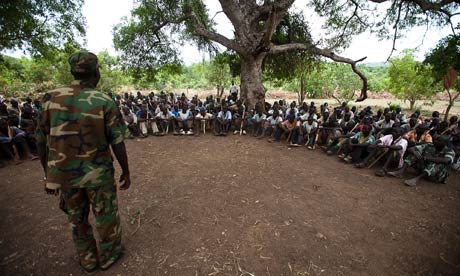From: Berhane Habtemariam (Berhane.Habtemariam@gmx.de)
Date: Sun Aug 28 2011 - 06:33:16 EDT
Sudan's unfinished business: fighting in Southern Kordofan
South Sudan has gained independence but in Sudan the conflict continues in
the contested border state of Southern Kordofan, and the UN has compiled
reports of atrocities
. Posted by <http://www.guardian.co.uk/profile/sara-pantuliano>
Sara Pantuliano Sunday 28 August 2011 07.00 BST
<http://www.guardian.co.uk/> guardian.co.uk
While the world focused on the historic creation of the state of
<http://www.guardian.co.uk/world/south-sudan> South Sudan last month, UN
officials and investigators were busy compiling reports of atrocities in
Southern Kordofan, a contested border state in north
<http://www.guardian.co.uk/world/sudan> Sudan. It is partly populated by
Nuba communities - who took up arms alongside the Sudan People's Liberation
Movement/Army (SPLM/A) during Sudan's long-running civil war.
The investigations, one
<http://www.unhcr.org/refworld/docid/4e4d1b2a2.html> published by the UN
Office of the High Commissioner for Human Rights (pdf) (OHCHR) and the other
<http://www.sudantribune.com/UNMIS-report-on-the-human-rights,39570> leaked
from the UN Mission in Sudan (Unmis), conclude that serious violations of
<http://www.guardian.co.uk/law/human-rights> human rights and humanitarian
law were committed after conflict erupted in Southern Kordofan on 5 June
between the government of Sudan and the northern remnant of the SPLM/A, now
referred to as the SPLM/A North (SPLM/A-N).
The 2005 comprehensive peace agreement (CPA) between the government of Sudan
and the SPLM ended decades of north-south civil war but failed to make
adequate provision for the border regions in the north of Sudan where many
had fought alongside the southern forces. In Southern Kordofan in
particular, the process of administrative and military integration between
the government and the local branches of the SPLM/A was never genuinely
realised.
The resurgence of conflict in Southern Kordofan did not take Sudan observers
by surprise. But the brutality in the first few weeks was chilling. The UN
reports contain a catalogue of atrocities, including extrajudicial killings,
arbitrary arrests, disappearances and looting. An estimated 200,000 people
have been displaced after daily bombardments of densely populated civilian
areas by the Sudanese military.
The reports describe how civilians fleeing the violence sought refuge where
there was none - first, in the police compound; then in the churches; then
in the "protective perimeter" established next to the UN compound in
Kadugli, where thousands sought protection. The reports document how Unmis
was unable or unwilling to intervene as armed men entered the perimeter site
targeting ethnic Nuba and those suspected of SPLM/A-N affiliation. They also
document how local Unmis staff were dragged from their vehicles and
detained.
Unmis's mandate expired on 9 July, the date of South Sudan's independence,
and peacekeepers and civilian staff have started withdrawing from Southern
Kordofan. Most international aid organisations have also left the area or
have withdrawn staff following the outbreak of the fighting.
Each side accuses the other of starting the conflict and dragging the region
back into war. Khartoum's enemies accuse it of ethnic cleansing against
Nubas, and speak of another Darfur. Khartoum accuses South Sudan of
sponsoring a campaign to further undermine President Omar al-Bashir -
already indicted by the international criminal court for war crimes and
crimes against humanity in Darfur.
The Sudanese government has rebutted the OHCHR's findings, as no UN human
rights monitors were able to conduct field investigations. As the propaganda
war escalates, it is essential that independent investigators are allowed in
by both parties, in order to establish what has happened in Southern
Kordofan since 5 June.
Khartoum announced last Saturday that it will permit six UN agencies to take
part in a government-organised mission to Southern Kordofan to assess the
human rights situation and humanitarian needs. This is a welcome move, as is
Tuesday's declaration by the government of a two-week unilateral ceasefire.
However, the presence of government officials on the assessment mission
means that there is a danger access will be restricted to areas under
government control, and that the human rights investigation will be
constrained.
Regarding the humanitarian assessment, it is vital that humanitarian
organisations be allowed to access areas controlled by the SPLM/A-N.
Displaced people in these areas have so far been assisted by local aid
workers using the minimal relief supplies left behind by international
organisations. These stocks have now been exhausted, and conditions will
further deteriorate as hunger increases and respiratory diseases are
exacerbated by the rains.
All parties to the conflict must grant unimpeded access for humanitarian
organisations, to enable them to reach affected populations. Many Nuba in
Southern Kordofan were victims of a 13-year de facto humanitarian blockade
during the civil war. This denial of aid must not happen again.
While safe access for aid agencies must be a priority, the key to resolving
humanitarian issues lies in reaching a negotiated solution to the conflict.
The previous conflict in the area has shown how difficult it would be for
either party to achieve a total military victory. A lasting political
solution to the conflict, which addresses its root causes, is critical for
the long-term security and stability of both Sudan and South Sudan.
MDG : Souther Kordofan : New recruits for the SPLA in a secret camp in the
Nuba mountains
New recruits in a secret camp in the Nuba Mountains of Southern Kordofan
train to join fighters from the Sudan People's Liberation Movement/Army
North. Photograph: Trevor Snapp/AFP

------------[ Sent via the dehai-wn mailing list by dehai.org]--------------